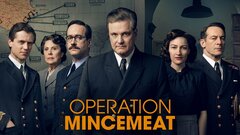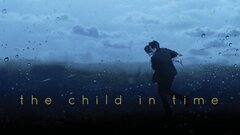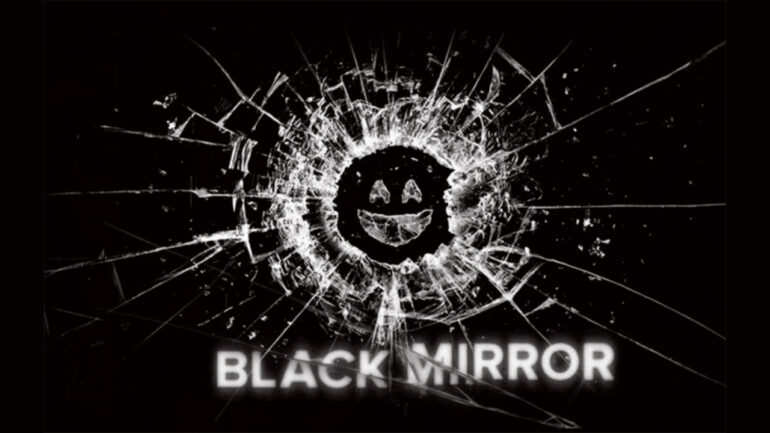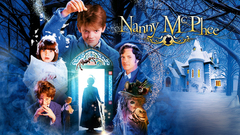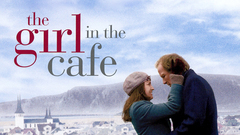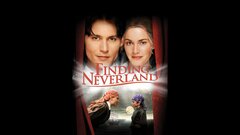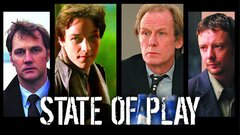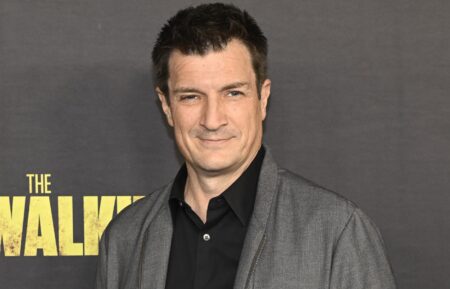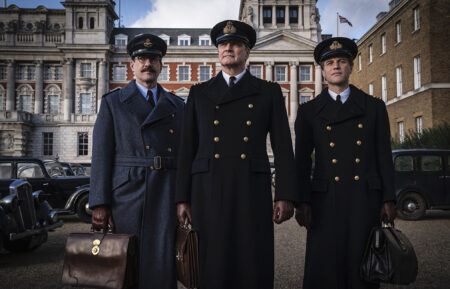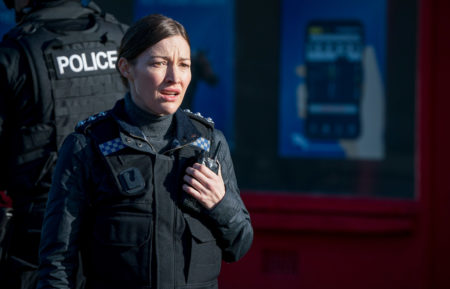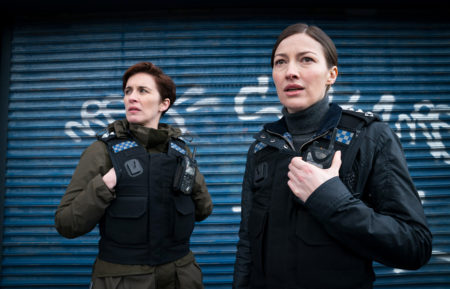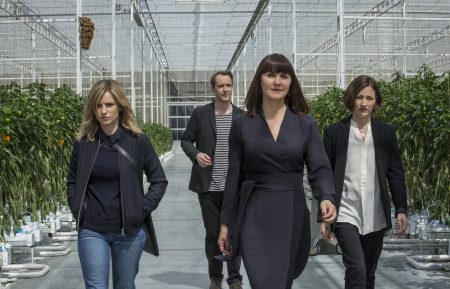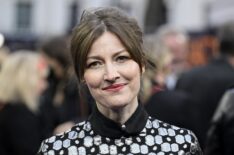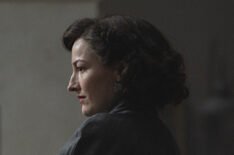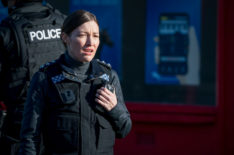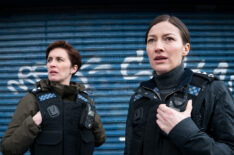Ever since her debut as one of the stars in Danny Boyle's "Trainspotting" (1996), actress Kelly MacDonald enjoyed a vibrant and award-worthy career. Though not necessarily a household name, Macdonald nonetheless delivered some finely-tuned performances in many noted films without any formal training - highly unusual from an actress from across the pond.
After "Trainspotting," she settled into a series of supporting roles in films like "Elizabeth" (1998) and "Gosford Park" (2001); the latter of which earned her considerable acclaim and recognition for being part of an excellent ensemble cast. But it was her small screen performance in "The Girl in the Café" (HBO, 2005) that propelled her career, thanks in large part to winning an Emmy Award for supporting actress. MacDonald parlayed this success into a breakout feature performance in "No Country for Old Men" (2007), which in turn led to her acclaimed role on the hit cable series, "Boardwalk Empire" (HBO, 2010-14). Regardless of time, place or accent, Macdonald demonstrated a wide-ranging talent that consistently pushed her to new heights.
Born on Feb. 23, 1976 in Glasgow, Scotland, MacDonald was raised in a working class home that was split apart when her parents divorced while she was very young. Estranged from her father, MacDonald grew up on a council estate - the United Kingdom's version of public housing - in Newton Mearns with her mother and brother, David. She gained her first acting experience when she joined an amateur theatrical club that met once a week for two months - an experience that left her energized.
When she was 17, MacDonald left home and briefly considered attending drama school, but balked due to her shyness. While working as a barmaid, she saw a leaflet advertising an open casting call for a film called "Trainspotting" (1996). Her friends encouraged her to go, which she did with no expectations of landing the part. But much to her surprise, director Danny Boyle cast her as Diane, the underage love interest of a young man (Ewan McGregor) trying to kick his troubling heroin addiction.
As the only female lead, MacDonald gave an uncompromising breakthrough performance, impressing both critics and audiences and making her an overnight celebrity, as well as a BAFTA nominee for Best Film Actress.
MacDonald's auspicious debut in "Trainspotting" was followed by another star turn with the grim drama "Stella Does Tricks" (1996), playing a young prostitute in Scotland looking to escape the trade. MacDonald proved to be one to watch with her compelling turn as the titular Stella, impressing the film's unfortunately limited audience with her heartbreaking performance as the spunky heroine.
In "Cousin Bette" (1998), the actress was cast as the superficially sweet, but ultimately tragic Hortense Hulot, Bette's romantic competition, in the adaptation of Honore de Balzac's acclaimed novel. Dressed in period costume with perfect blonde curls and mannered speech quite unlike her native Scottish, MacDonald was barely recognizable from her first two films. She more than held her own, however, in a cast that included Jessica Lange, Geraldine Chaplin and Elizabeth Shue. Also that year, she played Lettice Knollys, the famed courtier to the Virgin Queen in "Elizabeth" (1998).
The up and coming actress also starred in Phil Joanou's autobiographical "Entropy" (1999), about the unraveling of a filmmaker's life while making a documentary about U2, which she followed with a colorful supporting role in Gregg Araki's "Splendor" (1999).
After a small role in the humorous drama "My Life So Far" (1999), she had a larger part in Mike Figgis' "The Loss of Sexual Innocence" (1999), an episodic, non-linear film about the sexual awakening of a young Kenyan man (Julian Sands). In "Two Family House" (2000), she was a pregnant young Irish woman living in a home with her husband (Kevin Conway) when both become unwanted tenants after a factory worker (Michael Rispoli) buys the house with dreams of turning it into a neighborhood bar.
A supporting role in "Some Voices" (2000), an amusing drama about a schizophrenic (Daniel Craig) adjusting to the outside world, was followed by a starring role in "House!" (2000), in which she played a clairvoyant bingo caller who must decide whether or not to use her psychic abilities to save her soon-to-be out of business employer. She next appeared in the romantic comedy-of-errors, "Strictly Sinatra" (2001), as the girlfriend of a wannabe crooner (Ian Hart) who follows in Ole' Blue Eye's footsteps by teaming up with a local gang of thugs in order to make it big.
MacDonald gained widespread recognition and acclaim for her next film, "Gosford Park" (2001), director Robert Altman's satirical upstairs-downstairs murder mystery where the lord of an English manor (Michael Gambon) is murdered by one of his weekend guests or one of their servants, many of whom had plenty of reason to kill him. MacDonald played the wide-eyed maid of the crusty, privileged aunt (Maggie Smith) of their host's young wife (Kristin Scott Thomas). In a smooth transition to the small screen, she co-starred opposite Glenn Close and Ellen Burstyn in "Brush With Fate" (CBS, 2003), a period drama surrounding a lost painting supposedly created by Dutch master Johannes Vermeer. She next starred in "State of Play" (BBC America, 2003), a crime thriller about a rising member of Parliament (David Morrissey) drawn into a spiral of lies and deceit after a research assistant accidentally dies in an underground station. MacDonald was the associate of a journalist (John Simm) who begins to piece together the mystery of what happened.
Returning to features, she appeared in "Intermission" (2004), a violent crime thriller about a group of Dubliners brought together by a bank robbery hatched by her ex-boyfriend (Colin Farrell). Following an appearance on an episode of "Alias" (ABC, 2001-06), she was the fictional Peter Pan in "Finding Neverland" (2004), a moving drama about playwright J.M. Barrie (Johnny Depp) and his relationship with four fatherless boys (including Freddie Highmore) and their mother (Kate Winslet). Despite a long and extensive resume, MacDonald had yet to really make a name for herself in America.
That began to change with a starring role in "The Girl in the Café" (HBO, 2005), in which she played a mysterious woman who meets a shy civil servant (Bill Nighy) and is brought by him to the G8 Summit in Iceland, where both are thrown into an emotional conflict between personal conviction and professional obligation. After earning a nod at the Golden Globes, Macdonald won an Emmy Award for Outstanding Supporting Actress in a Miniseries or Movie.
Her win at the Emmys positioned the young actress for bigger and better things. Following supporting roles in "Nanny McPhee" (2005) and "The Hitchhiker's Guide to the Galaxy" (2005), she played the put-upon wife of an obnoxious Englishman (Steve Coogan) who narrates his life story from birth and runs afoul of everyone in his path in "Tristram Shandy: A Cock and Bull Story" (2005).
MacDonald earned considerable praise for her small, but impactful performance in "No Country for Old Men" (2007), a stark and rather minimalist Western noir made by Joel and Ethan Coen. Ditching her Scottish accent for a Texas twang, MacDonald delivered a bright, but tragic performance as the wife of a Vietnam vet (Josh Brolin) who goes on the run from a ruthless killer (Javier Bardem) after making off with his $2 million. After appearing opposite Sam Rockwell and Anjelica Huston in the adaptation of Chuck Palahniuk's novel, "Choke" (2008), MacDonald starred as a shy and reserved woman who befriends a kindred broken spirit (Michael Keaton) after running away from a troubled marriage in "The Merry Gentlemen" (2009), Keaton's directorial debut.
Tackling her first role as a series regular, MacDonald co-starred on "Boardwalk Empire" (HBO, 2010-14), a Prohibition-era drama series that centered on a group of organized crime figures who rule over Atlantic City. The actress played Margaret Schroeder, a young Irish widow and mother who turns to Enoch "Nucky" Thompson, the casino city's most corrupt and powerful political figure, for help, only to become his mistress. Executive produced by Martin Scorsese, who also directed the pilot episode, "Boardwalk Empire" was hailed by critics for its complex storytelling and rich characterization. For her part, MacDonald earned Best Supporting Actress nominations at both the Golden Globes and Emmy Awards.





